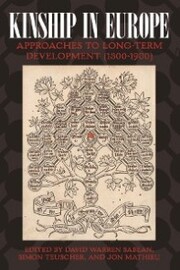-
Zusatztext
-
<p> Since the publication of Philippe Arièss book,<em>Centuries of Childhood</em>, in the early 1960s, there has been great interest among historians in the history of the family and the household. A central aspect of the debate relates the story of the family to implicit notions of modernization, with the rise of the nuclear family in the West as part of its economic and political success. During the past decade, however, that synthesis has begun to break down. Historians have begun to examine kinship - the way individual families are connected to each other through marriage and descent - finding that during the most dynamic period in European industrial development, class formation, and state reorganization, Europe became a kinship hot society. The essays in this volume explore two major transitions in kinship patterns - at the end of the Middle Ages and at the end of the eighteenth century - in an effort to reset the agenda in family history.</p>
-
-
Kurztext
-
Since the publication of Philippe Aris's book, Centuries of Childhood, in the early 1960s, there has been great interest among historians in the history of the family and the household. A central aspect of the debate relates the story of the family to implicit notions of modernization, with the rise of the nuclear family in the West as part of its economic and political success. During the past decade, however, that synthesis has begun to break down. Historians have begun to examine kinship - the way individual families are connected to each other through marriage and descent - finding that during the most dynamic period in European industrial development, class formation, and state reorganization, Europe became a "e;kinship hot"e; society. The essays in this volume explore two major transitions in kinship patterns - at the end of the Middle Ages and at the end of the eighteenth century - in an effort to reset the agenda in family history.
-
-
Autorenportrait
- <p><b>Jon Mathieu</b> has taught in various universities in Switzerland and other countries. He was the founding director of the Istituto di Storia delle Alpi at the University of Lugano. Currently he is a professor at the University of Lucerne.</p>
Detailansicht
Kinship in Europe
eBook - Approaches to Long-Term Development (1300-1900)
ISBN/EAN: 9780857456861
Umbreit-Nr.: 2164665
Sprache:
Englisch
Umfang: 352 S.
Format in cm:
Einband:
Keine Angabe
Erschienen am 01.10.2007
Auflage: 1/2007
E-Book
Format: EPUB
DRM: Adobe DRM


